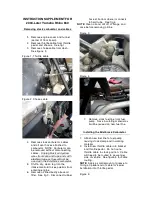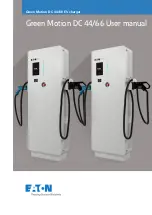
Supplemental Driver And Front Passenger Knee
Air Bag Inflator Units
The Supplemental Knee Air Bag units are located in the
instrument panel trim beneath the steering column and
below the glove compartment. When the ORC detects a
collision requiring the air bag, it signals the inflator units.
A large quantity of non-toxic gas is generated to inflate
the Supplemental Knee Air Bags. The trim cover sepa-
rates and folds out of the way allowing the air bags to
inflate to the full size. The air bags fully inflate in about
15 to 20 milliseconds. The Supplemental Knee Air Bag
gas is vented through small vent holes in the side of the
air bags.
Supplemental Seat-Mounted Side Air Bag (SAB)
Inflator Units
The Supplemental Seat-Mounted Side Air Bags (SAB) are
designed to activate only in certain side collisions.
The ORC determines if a side collision requires the side
air bags to inflate, based on several factors, including the
severity and type of collision.
based on several factors, including the severity and type
of collision, the side air bag inflators on the crash side of
the vehicle may be triggered, releasing a quantity of
non-toxic gas. The inflating SABs exit through the seat
seam into the space between the occupant and the door.
The SABs fully inflate in about 10 milliseconds. The side
air bag moves at a very high speed and with such a high
force that it could injure you if you are not seated
properly, or if items are positioned in the area where the
side air bag inflates. This especially applies to children.
Supplemental Side Air Bag Inflatable Curtain
(SABIC) Inflator Units
During collisions where the impact is confined to a
particular area of the side of the vehicle, the ORC may
deploy the SABIC air bags, depending on several factors,
76
THINGS TO KNOW BEFORE STARTING YOUR VEHICLE
Summary of Contents for 2013 Dart
Page 4: ......
Page 7: ...1 INTRODUCTION 5 ...
Page 10: ......
Page 73: ...Not Seated Properly Not Seated Properly 2 THINGS TO KNOW BEFORE STARTING YOUR VEHICLE 71 ...
Page 74: ...Not Seated Properly Not Seated Properly 72 THINGS TO KNOW BEFORE STARTING YOUR VEHICLE ...
Page 100: ......
Page 145: ...3 UNDERSTANDING THE FEATURES OF YOUR VEHICLE 143 ...
Page 146: ...144 UNDERSTANDING THE FEATURES OF YOUR VEHICLE ...
Page 147: ...3 UNDERSTANDING THE FEATURES OF YOUR VEHICLE 145 ...
Page 179: ...Voice Tree 3 UNDERSTANDING THE FEATURES OF YOUR VEHICLE 177 ...
Page 181: ...3 UNDERSTANDING THE FEATURES OF YOUR VEHICLE 179 ...
Page 192: ...Voice Tree 190 UNDERSTANDING THE FEATURES OF YOUR VEHICLE ...
Page 194: ...192 UNDERSTANDING THE FEATURES OF YOUR VEHICLE ...
Page 196: ...194 UNDERSTANDING THE FEATURES OF YOUR VEHICLE ...
Page 198: ...196 UNDERSTANDING THE FEATURES OF YOUR VEHICLE ...
Page 200: ...198 UNDERSTANDING THE FEATURES OF YOUR VEHICLE ...
Page 239: ...One Half Second Tone Slow Tone 3 UNDERSTANDING THE FEATURES OF YOUR VEHICLE 237 ...
Page 240: ...Slow Tone Fast Tone 238 UNDERSTANDING THE FEATURES OF YOUR VEHICLE ...
Page 241: ...Fast Tone Fast Tone 3 UNDERSTANDING THE FEATURES OF YOUR VEHICLE 239 ...
Page 282: ......
Page 287: ...INSTRUMENT CLUSTER BASE 4 UNDERSTANDING YOUR INSTRUMENT PANEL 285 ...
Page 288: ...INSTRUMENT CLUSTER PREMIUM ANALOG 286 UNDERSTANDING YOUR INSTRUMENT PANEL ...
Page 289: ...INSTRUMENT CLUSTER PREMIUM DIGITAL 4 UNDERSTANDING YOUR INSTRUMENT PANEL 287 ...
Page 384: ......
Page 444: ...442 STARTING AND OPERATING ...
Page 490: ......
Page 574: ......
Page 582: ......
Page 593: ...INDEX 10 ...
Page 614: ......
















































